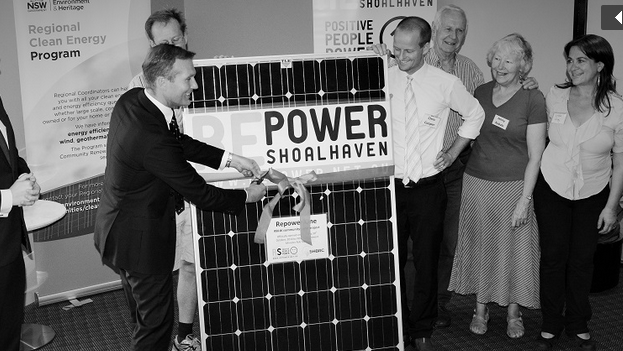
Repower Shoalhaven – the community energy group behind two successful crowd-funding projects – is set to launch its third round of solar fundraising, to put another 100kW of solar on local New South Wales businesses.

The Repower Three campaign – to be launched in Bomaderry on Wednesday night – aims to raise $143,000 to install solar on a number of well known local businesses including the Milkwood bakery, a cafe in Berry, and a dairy farm in Numbaa.
As we have reported here before, Repower Shoalhaven is a member-based non-profit association developing community solar projects in the Shoalhaven, Illawarra, Southern Highlands and Eurobodalla region of NSW.
Formed in 2013, it started life 100% run by volunteers who, according to founding president Chris Cooper, “met once a month in the town library to make it happen… driven by the desire to see a strong local economy and proactive action on climate change.”
These days it is boasts five part-time staff and works out of an office in Bomaderry. As Cooper told the Local Energy and Microgrids conference in Sydney last month, the organisation’s aim is to reach viability in 2016, with a dedicated crowdfunding website to be launched mid-year at www.repower.org.au.
Repower’s success has laid in targeting what Cooper describes as the seven organisational barriers to getting commercial solar, including landlord/tenant barriers, common property barriers, capital barriers, aesthetic barriers, future uncertainty barriers, information barriers, and decision making barriers.
So far, the approach has been a great success. Repower One, launched in 2014, put a 99kW community-funded solar power system on the roof of the Shoalhaven Heads Bowling and Recreation Club. A first-of-its-kind project at the time – and also, at the time, the biggest community-funded rooftop solar installation – the system was 20 per cent funded and owned by Shoalhaven Heads Bowling and Recreation Club, and 80 per cent funded and owned by community shareholders.
Repower Two raised $53,300 to install two 15kW solar systems on the roofs of two local churches – the Nowra City Church in North Nowra and the Figtree Anglican Church in Figtree. On top of their original investment amount, investors in Repower Two were forecast to receive an average cash return of 6.5 per cent per annum over 10 years.
The Repower Three project aims up the ante a little for investors, offering an estimated 7 per cent cash return.
Repower 3 from Repower Shoalhaven on Vimeo.
For his part, Chris Cooper, who was awarded Winston Churchill Fellowship in 2015, is more and more passionate about community energy, and on top of Repower Shoalhaven, is busy coordinating Australia’s first bulk-buy program to offer battery storage products at “below market prices” for individual and community projects, and make installation easier.
More than that, though, the Suncrowd initiative aims to be a one-stop shop for the end of the NSW solar feed-in tariff, offering rooftop solar owners a check-up of their system, advice on changing energy retailer, meter replacement, solar system expansion and, of course, energy storage, to optimise the consumption of solar generation rather than sell it back to the grid for a pittance.
As we reported here, the group launched its first trial in Newcastle at the start of May, liaising with a local community energy group Climate Action Newcastle, and will launch across New South Wales in July and the rest of the country in 2017.
In his report to the Winston Churchill Memorial Trust, Cooper said that he believed the time was right in Australia to instill a fundamental shift in ARENA funding towards the “Jigar Shah approach” of cleantech public funding – referring to the SunEdison co-founder credited with inventing the power purchase agreement (PPA).
“His approach goes more like ‘Dear Bill Gates: we already have the technology to solve climate change’,” Cooper writes. “Jigar tends to think we need to focus heavily on deployment and innovation should focus on software, soft-costs, finance costs, customer acquisition and any other innovative business model which overcomes barriers to uptake.
“For Australia, with declining manufacturing and one of the most attractive distributed energy markets in the world, it makes much more sense to fund innovative business models which overcome adoption barriers to already mature technologies.
“These solutions are much lower risk, are scaleable, and have a faster payoff for public funding relative to early stage R&D. What’s more, they create economic activity and jobs in Australia.”

Sophie is editor of One Step Off The Grid and deputy editor of its sister site, Renew Economy. Sophie has been writing about clean energy for more than a decade.


